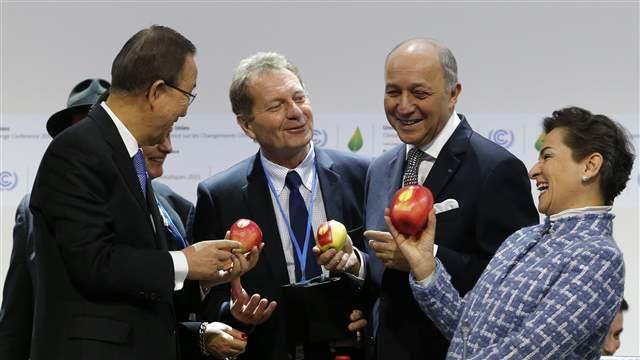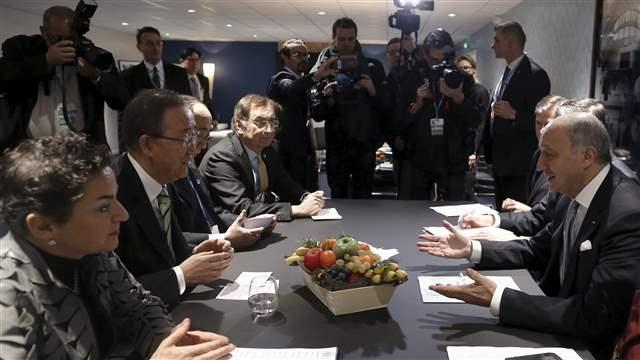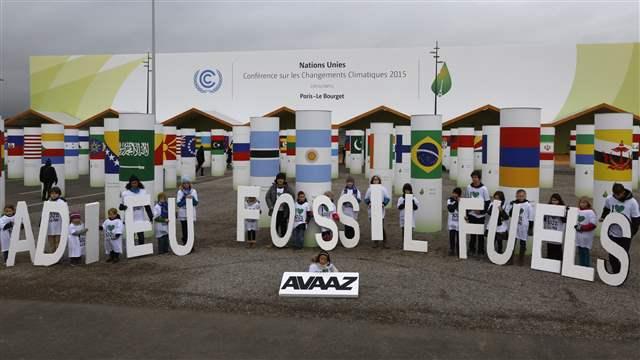Six years of on-again, off-again progress toward a global climate deal culminated in Paris, as negotiators for the United Nation’s opaquely named Conference of the Parties met in their 21st session. The deal struck by the UN Framework Convention on Climate Change (UNFCCC) scored a rare victory for global multilateral deal making. The UN should take a victory lap. And then we should rapidly move on. We need the UN to be the umbrella under which real negotiations happen, not the venue of those negotiations themselves.

Reuters/Stephane Mahe – Laurent Fabius, Ban Ki-moon and Christiana Figueres hold apples marked with the logo of the World Climate Change Conference 2015 during a meeting at Le Bourget, near Paris, France, December 7, 2015
Climate change is an enormously complicated problem, perhaps the most complicated ever tackled by international negotiations. At its core, it is about the way societies fuel their economic activity. For most of the modern period, economic growth and energy growth have moved in lockstep. Only in the last two years have we seen even the beginnings of a decoupling of energy growth from greenhouse gas emissions. And, at present, in most countries the forms of energy that power economic growth are those with the highest concentrations of carbon—oil and coal. Natural gas is an important bridge technology, or at least it can be if fugitive methane is controlled (and it probably can be). Ultimately, of course, carbon-free energy is the answer—but a widespread shift from plentiful, low cost forms of energy (principally oil and coal and now gas) to mostly-still-expensive renewables and nuclear has yet to materialize.
Climate change and the great power dynamics
Seen through that lens, criticisms of the UNFCCC for having failed so far to craft a legally binding global climate deal are absurd. Is it really conceivable that an inclusive, diplomatic body engaging the foreign and environmental policy ministries of 193 countries, and working broadly by consensus, is the right body to chart the pathway toward a hugely complicated economic transition? A transition, moreover, that matters most in a handful of countries. We talk about climate change as a global problem—and obviously, the consequences of climate change are global. But it only takes three economies—the United States, China and India—to get to more than 40% of all global greenhouse gas emissions. Add the European Union and you reach 75% of global greenhouse gas output.[1] Climate change may be the ultimate global issue in its consequences, but the driving dynamics are those of great powers.
We need the U.N. to be the umbrella under which real negotiations happen, not the venue of those negotiations themselves.
And the great or major power dynamics here are complicated enough. Climate change is not actually a “we are all in one boat” problem. Yes, many countries will suffer if the world gets dramatically hotter—but not all countries, and not equally. We know an increasing amount about who will lose (India, North Africa, the American Midwest) and who will win (the UK, parts of northern Europe) in a slightly hotter world. A shift toward unpredictable weather and rising seas is uncharted and worrying territory, but a future loss of agricultural productivity (the first and most likely economic consequence of a hotter world) is a distant worry for an Indian farmer currently toiling well below the poverty line and with no access to modern power. India and the United States, increasingly aligned on strategic issues, are in opposite worlds when it comes to climate change mitigation.
Weaknesses of the UNFCC negotiation process
The UNFCCC process to date has had one major advantage: it carries the perceived legitimacy that comes from the slow, grinding, and frustrating but genuinely inclusive process that characterizes contemporary global negotiations. For setting up a broad policy framework and a set of global goals, inclusion is the right way to go. For getting action, not so much.
The UNFCCC process, for all its legitimacy, has two deep weaknesses that will have to be left behind if we’re going to start crafting genuine economic and energy policy that puts us on a path toward limiting global temperature rises to between 1.5° and 4° Celsius.[2]
First, it’s too inclusive. That’s not a politically correct sentiment in multilateral circles, but it’s a reality. Historically, the UNFCCC has worked on what’s known as the “hard consensus” rule, which has meant achieving unanimity to craft an agreement. This led to the absurd consequence of a deal brokered by President Obama in Copenhagen, brokered with China, India, Brazil, and South Africa, and that garnered support from the EU and many other countries—a deal, in short, that captured well over 90 percent of global carbon emissions—being blocked by those titans of economic power, Bolivia and Venezuela. That’s not a democratic system, as its champions would claim; that’s the tyranny of the (tiny) minority.
Recently, in an important deal crafted under Mexican leadership in 2013-14, the UNFCCC has moved away from hard consensus toward more typical consensus rules—which at the UN normally mean that the vast majority of countries have to agree, and every important country has to agree, but small, irrelevant players can’t block progress. That’s a step in the right direction, but a small step. Even with softer consensus rules, the weight of UN climate negotiations is still tilted heavily toward small, developing states. They have every moral right to a seat at the table and a voice in global climate negotiations. But the hard, costly mitigation measures must be taken by the world’s top economies. When it comes down to brass tacks, an inclusive concern with the legitimate interests of the 160 countries that collectively make up less than 10 percent of global emissions is a distraction.
The second problem with the UN negotiations is that some policymakers with the most powerful levers to effect change, particularly finance ministers, are largely absent from the mitigation negotiations. In almost all major markets, energy policy comes out of a complex—and often combative—interaction between regulatory agencies, economic agencies, sub-federal regulators, and the private sector, and the those who prevail in those debates aren’t necessarily responsible for climate negotiations. In particular, to the extent that climate commitments can compromise domestic economic growth or trade competitiveness, environment ministries may not be the real agenda-setting authorities. A key way to align mitigation commitments and the real authority to meet them is to involve the most powerful ministers more directly in climate talks.

Reuters/Stephane Mahe – Laurent Fabius, Ban Ki-moon and Christiana Figueres during the World Climate Change Conference 2015 at Le Bourget, near Paris, France, December 5, 2015
Faced with these challenges, the UN has taken two smart approaches. One is a focus on goals over concrete policy agreements, and another is to forge networks for public-private dialogue on those goals. That’s a reasonable scope of efforts for the goal-setting stage of these negotiations, and the men and women who’ve worked endless hours to get us a deal at Paris deserve far more recognition and honor than they are likely to get. Now that we have a deal at Paris, they should take a bow and then a back seat.
The UNFCCC vs. the G-20 vs. the MEF
That doesn’t mean that the UNFCCC should close up shop; rather, its normative and goal-setting and legal work has to be actively supplemented by more specific economic and energy policy discussions among the major economies in a body like the G-20 or the Major Economies Forum (MEF). The MEF and the G-20 each have their strengths and weakness on energy policy. The MEF has more energy policy in its DNA—it was established by the Bush administration with the more honest name of the Major Emitters Forum, precisely as a tool to discuss energy and climate policy. At birth, though, it was viewed by the major emerging powers (correctly) as an effort by the administration to undermine the UN and treated accordingly with distrust by countries like China.
The G-20 has the opposite strengths and weakness: the major emerging economies were ”present at creation” of the G-20 and view it favorably, but the G-20 has repeatedly shied away from tackling climate problems—even when it’s dealing with an issue like global infrastructure spending, which dominates the current G-20 agenda and is hugely consequential for shaping emissions trajectories. (Build a trillion-dollar infrastructure for oil and automobiles and that’s what we’re going to be using for the foreseeable future; build it for gas and rail and we’re on a different carbon pathway). The G-20 was supposed to tackle energy subsidies but has done so only rhetorically. Still, such decisions were made by men and can be undone by men and women. The G-20 (perhaps minus unhelpful Saudi Arabia) could create a working group on energy and climate policy that would do much to bridge under-communicating worlds of climate negotiations and real world energy/economic policy.
The men and women who would negotiate policy in a body like this are likely, given the domestic ministries they will come from, to have a better understanding of the economic implications of their commitments, and thus to craft more feasible and effective agreements. Of course, while macroeconomic and sector-specific outcomes matter, the private sector should not have a veto over climate policy; commercial interests are often misaligned with ambitious climate policy, and accountable officials should make decisions focused on the public interest. At least the natural gas revolution—by creating a profit stream for energy majors in a fuel that’s less carbon intensive than coal—has given some fossil producers a potentially productive role in the debate, the occasional energy dinosaur and most hard core climate activists notwithstanding. Among the more moderate actors on both sides we see the outlines of what Brookings President Strobe Talbott has called as “pragmatic caucus” around which genuine solutions could be built.
Balancing inclusion with efficiency
But if energy and climate policy shift to a major economies body like the G-20 or an equivalent, won’t the small countries and the developing world cry foul? They will, and they have good cause—they need a solution to climate change because they’ll be first in suffering the consequences of rising global temperatures, and they deserve a seat at the table as those solutions are crafted. So how to marry the legitimacy of inclusion with the efficacy of small group settings for the domestic policy actors of the small handful of countries that will have to do the heavy lifting?
And the great or major power dynamics here are complicated enough. Climate change is not actually a “we are all in one boat” problem. Yes, many countries will suffer if the world gets dramatically hotter—but not all countries, and not equally.
One option—which one of us first explored in a book with Carlos Pascual and Stephen Stedman—is to iterate the negotiations. In the U.S., legislation starts with an individual member of Congress or a small team; goes to a series of committees; then to the floor; and possibly back and forth between committees and the floor for refinement. In the international arena, we could think of this happening in reverse. To sustain a sense of international legitimacy, we would treat the Paris agreement as setting overarching emissions objectives for the next few years. The deal would then go to a variety of smaller “committees”—like the MEF or a G-20 Working Group on Energy—for far more detailed discussion of how countries will implement their commitments. The annual Conference of the Parties meetings can evolve into a vehicle for those smaller “committees” to report back to the global whole about progress. Smaller countries and developing states could voice their concerns and make their own (necessarily modest) contributions. The real mitigation action would lie with the major economies, and their talks would foster policy tools that allow cooperation and comparison, such GHG pricing measures. These talks would not be imposing a great powers’ solution on the world; they’d be acting within the mandate agreed at the COP.
The road ahead on climate change
Climate change is undoubtedly the hardest economic and social problem of our time. Inclusive diplomatic negotiations and some creativity on the part of the UN—all critically boosted, it should be stressed, by vital U.S.-China joint announcements in November 2014 and September 2015—will, by the time of Paris, conclude the first phase by crafting a global policy agreement. That will send an important message to those who’ve denied that climate change is a real problem, or sought to obstruct progress: get out of the way.

Reuters/Jacky Naegelen – Children of AVAAZ NGO activist group hold letters reading “farewell fossil fuels” as they demontrate at the entrance of the venue for the World Climate Change Conference 2015 in Le Bourget, near Paris, France, December 11, 2015
But Paris should also be a turning point away from the unproductive business of making broad declarative goals that are largely divorced from the economics of achieving them. Paris shouldn’t be a milestone, but rather a launching pad for a new phase of productive, practical conversations about the economic policies that can most cost effectively shift the global energy mix.
[1] In 2012, the top ten emitters by CO2-equivalent were China, the United States, EU 28, India, Russia, Japan, Brazil, Indonesia, Mexico, and Iran. http://www.wri.org/blog/2015/09/8-interactive-graphics-answer-top-climate-change-questions
[2] There is no unity within the scientific and policy community here, but there is a growing body of evidence that staying within a 2° rise is now all but out of reach.
The Brookings Institution is committed to quality, independence, and impact.
We are supported by a diverse array of funders. In line with our values and policies, each Brookings publication represents the sole views of its author(s).



Commentary
Beyond the Paris agreement: COP21 shouldn’t be a milestone, but rather a launching pad for a new phase of climate action
December 14, 2015